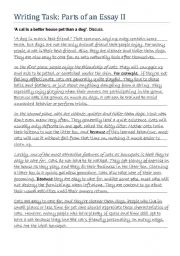
|
Writing: Parts of an Essay II
This follows on from the Parts of an Essay I. It is another essay about cats and dogs. Students are to discuss the first page. Then questions break down the essay even further. You can then make another essay if you like.
Level: advanced
Age: 12-17
Type: worksheet
Downloads: 39
|
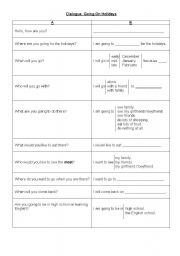
|
Dialogue: Going On Holidays - Low Elementary Level
This is a structured dialogue which you give low-level elementary students. It is about their future plans for the holidays.
Split the class into lines - A and B. You need even numbers to do this. Person A asks questions, person B answers them. Then swap A and B around. You ideally use this as a starter or plenary.
Level: elementary
Age: 14-17
Type: worksheet
Downloads: 16
|
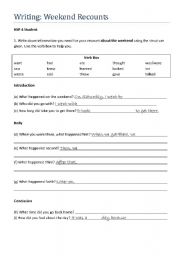
|
Writing Recounts Part III
Students use the verb box in the first part to answer the question skeletons about their weekend. They then copy the information from the questions to the second part to make a recount with an introduction, body and conclusion.
Level: elementary
Age: 10-12
Type: worksheet
Downloads: 7
|
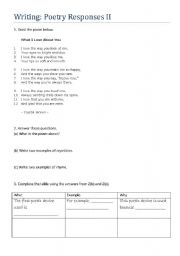
|
Writing: Poetry Responses II
This is the second worksheet that follows Writing: Poetry Responses I. Students identify poetic devices in the poems attached, and then combine them together to complete a scaffolded poetry response. Eventually, you�d want the students to write it on their own.
Level: elementary
Age: 12-17
Type: worksheet
Downloads: 8
|
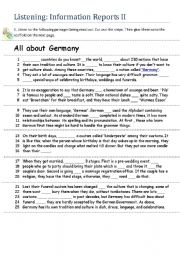
|
Information Reports II
In this worksheet, students do a listening task. The teacher reads out the information report on Germany to the class. Students fill in the blanks. The words are mainly simple verbs in the present tenses or prepositions, so it is useful for both elementary and beginning students. Then students cut and paste the information report onto the provided ...
Level: elementary
Age: 10-14
Type: worksheet
Downloads: 3
|
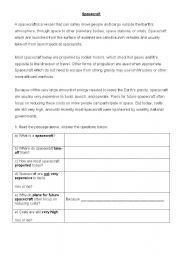
|
Spacecraft - Low-Level Elementary Comprehension
This worksheet has two short comprehensions in it.
The first one has key words put in bold so that the students know what to look for. The second one has no keywords but is very short so the keywords are obvious.
If the students are weak in reading, make sure they know how to search for the keywords in the passage by looking for the word in ...
Level: elementary
Age: 14-17
Type: worksheet
Downloads: 13
|
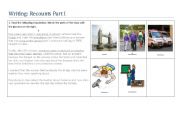
|
Writing Recounts Part I
This worksheet is a stepping stone in writing a recount. It steps the reader through looking at pictures and matching them to a piece of text to test comprehension. It then has a gapfill which allows the students to complete the gaps with what is happening, and students then progress up to writing their own recounts.
Level: elementary
Age: 10-14
Type: worksheet
Downloads: 7
|
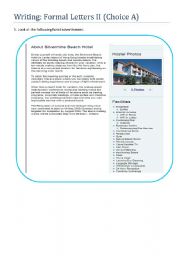
|
Writing: Formal Letters
This simple worksheet presents models of enquiry letters and letters to the editor from which the students can write their own. This is meant to be a follow-on activity after introducing formal letters.
Level: elementary
Age: 12-17
Type: worksheet
Downloads: 53
|
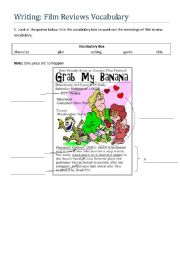
|
Film Reviews I
This is the first of two worksheets designed to step elementarty-level students through the process of writing a film review. The first step is to learn some film terminology through the mock-up film poster. (It was taken from another resource also found on here - I forgot the name of the file I took it from but thank you in advance).
The seco...
Level: elementary
Age: 10-14
Type: worksheet
Downloads: 46
|

|
Jealousy - Low-Level Elementary The Future Tense Exercise
The point of this �Jealousy� article is to teach the students how to spot the future tense, find similar phonemes and read them out.
How do you do this?
1. Get the students to only look for the words "will" and "going to".
2. Get students to write out ten sentences for "will" and "going to". They�ll most likely use the passage.
3. Get t...
Level: elementary
Age: 14-17
Type: worksheet
Downloads: 7
|